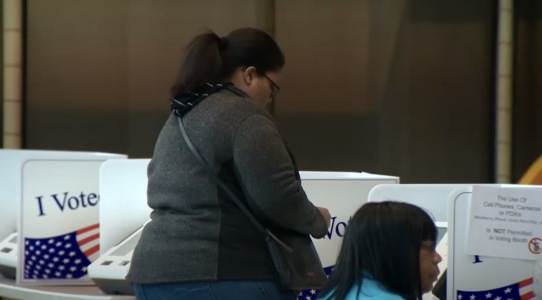What the SAVE Act could mean for voter registration in the US
By
Veronica E.
- Replies 6
Voting has long been considered one of the most important responsibilities of citizenship.
It’s how people help shape the future of their communities and have a say in decisions that affect everyday life.
That’s why it's important to stay informed about changes that may impact how individuals register and cast their ballots.
A bill recently passed in the House of Representatives—called the Safeguard American Voter Eligibility (SAVE) Act—is at the center of a growing national conversation.
Supporters say it would enhance election security, while others are expressing concern about its potential impact on access to the ballot.

The SAVE Act was passed by a 220–208 vote in the House and now moves to the Senate for further consideration.
If enacted, the legislation would require all individuals registering to vote in federal elections to provide documentary proof of US citizenship.
It also includes a requirement for states to remove noncitizens from voter registration rolls.
Under current law, noncitizens are already prohibited from voting in federal and most state elections.
The SAVE Act would add more formal verification measures to that process.
Supporters of the bill argue it would help strengthen the integrity of elections by ensuring that only eligible citizens are registered to vote.
They also emphasize that the bill gives states some flexibility in how they implement the documentation process.
Rep. Chip Roy, R-Texas, the author of the legislation, said in a statement Thursday that he was encouraged by the bill’s progress, stating, "Despite the ridiculous attacks and purposeful misinformation spread about the bill, I am pleased to see that the House of Representatives once again passed the SAVE Act on a bipartisan basis to ensure only US citizens vote in federal elections."
He added, "In order to preserve this republic, we must uphold what it means to be able to vote in a US election."
Following the bill’s passage, House Speaker Mike Johnson, R-La., told reporters, "You have to prove your identity because only US citizens should vote and decide US elections. It's already in federal law, but there's no mechanism currently to ensure that that law is always followed, and this measure, the SAVE act, will help make sure that it's true."
Some voting rights advocates and lawmakers have expressed concern that the SAVE Act could create barriers for eligible voters—particularly those without easy access to official documents due to factors like older records, name changes, or rural and home births.
When We All Vote, a voter advocacy group founded by former first lady Michelle Obama, called the bill "another attempt to silence voters and decrease participation in our elections," adding that it "would effectively end online, automatic and mail-in voter registration."
Michael Waldman, president of the nonpartisan Brennan Center for Justice at New York University School of Law, also urged the Senate to reject the bill.
"The House has just passed one of the worst pieces of voting legislation in American history. The Senate must stop it. The SAVE Act would put voting out of reach for millions of American citizens. It should not become law," he said in a statement.
Some policy groups estimate that more than 20 million eligible voters could struggle to meet the proposed documentation requirements.
President Donald Trump has expressed continued support for the SAVE Act, aligning it with his administration’s stance on election security.
While a previous attempt to attach the bill to a funding measure failed in the Senate, the House recently passed it with support from four Democrats.
Reps. Jared Golden (D-Maine), Marie Gluesenkamp Perez (D-Wash.), Henry Cuellar (D-Texas), and Ed Case (D-Hawaii) joined Republicans in backing the bill.
"I do not support noncitizens voting in American elections... Voting in our nation's elections is a sacred right belonging only to American citizens, and my vote for the SAVE Act reflects that principle," Gluesenkamp Perez said in a statement.
Still, she noted the bill "stands no chance of passage in the Senate due to the filibuster, as well as several deeply flawed provisions."
Golden said he was "confident" the bill addresses concerns about registration after name changes and added, "The right to vote in American elections should be exclusive to American citizens. Requiring people to prove citizenship when registering to vote is a simple way to ensure that's happening across the country."
The bill now heads to the Senate, where it would need at least 60 votes to move forward.
Similar proposals have been introduced in the past but did not advance beyond the House.
Lawmakers across the political spectrum have expressed a wide range of views, and the SAVE Act is expected to remain part of ongoing discussions about voting access and election security.
For many voters, participating in elections is an essential part of civic life. Whether voting in person or by mail, staying informed about the rules and requirements is an important step toward making sure every vote counts.
Read next: This everyday driving habit could soon cost you—is your state included?

Have you or someone you know ever had difficulty registering to vote due to documentation requirements? What do you think about this bill and its potential impact? Share your thoughts in the comments. Reader experiences and perspectives are a valuable part of the conversation!
It’s how people help shape the future of their communities and have a say in decisions that affect everyday life.
That’s why it's important to stay informed about changes that may impact how individuals register and cast their ballots.
A bill recently passed in the House of Representatives—called the Safeguard American Voter Eligibility (SAVE) Act—is at the center of a growing national conversation.
Supporters say it would enhance election security, while others are expressing concern about its potential impact on access to the ballot.

A newly passed bill could bring changes to how voters register for federal elections, sparking both support and concern across the country. Image Source: YouTube / WCNC.
What the bill proposes
The SAVE Act was passed by a 220–208 vote in the House and now moves to the Senate for further consideration.
If enacted, the legislation would require all individuals registering to vote in federal elections to provide documentary proof of US citizenship.
It also includes a requirement for states to remove noncitizens from voter registration rolls.
Under current law, noncitizens are already prohibited from voting in federal and most state elections.
The SAVE Act would add more formal verification measures to that process.
A range of reactions
Supporters of the bill argue it would help strengthen the integrity of elections by ensuring that only eligible citizens are registered to vote.
They also emphasize that the bill gives states some flexibility in how they implement the documentation process.
Rep. Chip Roy, R-Texas, the author of the legislation, said in a statement Thursday that he was encouraged by the bill’s progress, stating, "Despite the ridiculous attacks and purposeful misinformation spread about the bill, I am pleased to see that the House of Representatives once again passed the SAVE Act on a bipartisan basis to ensure only US citizens vote in federal elections."
He added, "In order to preserve this republic, we must uphold what it means to be able to vote in a US election."
Following the bill’s passage, House Speaker Mike Johnson, R-La., told reporters, "You have to prove your identity because only US citizens should vote and decide US elections. It's already in federal law, but there's no mechanism currently to ensure that that law is always followed, and this measure, the SAVE act, will help make sure that it's true."
Also read: Could this new executive order change how you vote? Here’s what nonprofits and lawmakers are doing to fight back
Some voting rights advocates and lawmakers have expressed concern that the SAVE Act could create barriers for eligible voters—particularly those without easy access to official documents due to factors like older records, name changes, or rural and home births.
When We All Vote, a voter advocacy group founded by former first lady Michelle Obama, called the bill "another attempt to silence voters and decrease participation in our elections," adding that it "would effectively end online, automatic and mail-in voter registration."
Michael Waldman, president of the nonpartisan Brennan Center for Justice at New York University School of Law, also urged the Senate to reject the bill.
"The House has just passed one of the worst pieces of voting legislation in American history. The Senate must stop it. The SAVE Act would put voting out of reach for millions of American citizens. It should not become law," he said in a statement.
Some policy groups estimate that more than 20 million eligible voters could struggle to meet the proposed documentation requirements.
Also read: Time is ticking: Why the Social Security Fairness Act could disappear
President Trump backs SAVE Act as four House Democrats vote in favor
President Donald Trump has expressed continued support for the SAVE Act, aligning it with his administration’s stance on election security.
While a previous attempt to attach the bill to a funding measure failed in the Senate, the House recently passed it with support from four Democrats.
Reps. Jared Golden (D-Maine), Marie Gluesenkamp Perez (D-Wash.), Henry Cuellar (D-Texas), and Ed Case (D-Hawaii) joined Republicans in backing the bill.
"I do not support noncitizens voting in American elections... Voting in our nation's elections is a sacred right belonging only to American citizens, and my vote for the SAVE Act reflects that principle," Gluesenkamp Perez said in a statement.
Still, she noted the bill "stands no chance of passage in the Senate due to the filibuster, as well as several deeply flawed provisions."
Golden said he was "confident" the bill addresses concerns about registration after name changes and added, "The right to vote in American elections should be exclusive to American citizens. Requiring people to prove citizenship when registering to vote is a simple way to ensure that's happening across the country."
The bill now heads to the Senate, where it would need at least 60 votes to move forward.
Similar proposals have been introduced in the past but did not advance beyond the House.
Lawmakers across the political spectrum have expressed a wide range of views, and the SAVE Act is expected to remain part of ongoing discussions about voting access and election security.
For many voters, participating in elections is an essential part of civic life. Whether voting in person or by mail, staying informed about the rules and requirements is an important step toward making sure every vote counts.
Read next: This everyday driving habit could soon cost you—is your state included?
Key Takeaways
- The House of Representatives recently passed the Safeguard American Voter Eligibility (SAVE) Act, which would require documented proof of citizenship to register for federal elections.
- Supporters of the bill say it helps protect election integrity, while critics raise concerns it could create obstacles for eligible voters.
- The bill passed in the House with limited bipartisan support and now moves to the Senate, where its future is uncertain.
- Voting rights groups and some lawmakers are concerned the bill could impact access to registration, especially for individuals without immediate access to citizenship documents.
Have you or someone you know ever had difficulty registering to vote due to documentation requirements? What do you think about this bill and its potential impact? Share your thoughts in the comments. Reader experiences and perspectives are a valuable part of the conversation!






